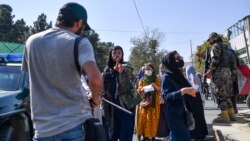Journalism under Taliban rule is risky, but many Afghan journalists shun exodus to keep audiences informed
About this project: Hundreds of Afghan journalists fled the Taliban takeover, but many more chose to stay. From keeping a leading network on air and ensuring minorities and women still had a voice, to a commitment to not walk away from two decades of hard-fought gains, journalists across Afghanistan say they have a responsibility to their country and their audiences to keep reporting. Here, they tell their stories.
The week after the Taliban seized Afghanistan's capital, Kabul, on August 15, Hujatullah Mujadidi received an urgent email that promised a quick exit.
A flight arranged by the French government and leaving Kabul the following day could take the journalist and his family to safety.
Two other emails from the French embassy in Kabul followed, sharing details on the transport arrangements to the airport for him and other journalists.
"Just bring what is strictly necessary: pack light, water and some food," read a final email, sent at 3:09 a.m.
Mujadidi, at the time one of the last remaining prominent press freedom advocates in Afghanistan, had three hours to make a decision.
"On the one hand, I was thinking about my children and their future," Mujadidi told VOA. "On the other, I was thinking about the journalists calling, telling me I am their only contact."
In the end, Mujadidi put journalism over family.
His decision was unusual but not unique.
As the Taliban took power, scores of journalists, including some from VOA's Afghan Service, left Afghanistan, fearing for their personal safety or a return to a repressive media climate.
Yet many more remained.
Some lacked the means to move overseas, but others made a deliberate decision to remain.
Their motives vary: from a commitment to keeping Afghanistan's leading news network on air, to ensuring that minority groups including the Hazaras still have a voice and encouraging women journalists to keep working.
All have played a critical role in keeping the media sector afloat.
"Obviously, they're under pressure, but they've kept the form alive," said Steven Butler, Asia program coordinator for the New York-based Committee to Protect Journalists.
VOA spoke with journalists from across Afghanistan who decided to remain in the country.
In interviews a few months after the Taliban takeover, these journalists described their commitment to journalism and guarded optimism that conditions would improve.
But in follow-up interviews in March, the mood changed. One journalist asked to be removed from the project for fear of arrest. To ensure his safety, VOA complied with the request.
Despite early promises to allow media to report freely, the Taliban instead imposed restrictions, ordered local media to not carry foreign-produced news or entertainment shows, and detained journalists who defied their directives.
"In the past three to four months, my optimism has dampened," said Khpalwak Sapai, director of TOLOnews. "I'm not certain how much longer the independent media can survive."
Sapai takes pride in having stayed in Afghanistan to keep TOLO — the country's leading news network — from "going dark." But where he was once deeply committed to his job, Sapai now says he has lost the "drive" to stay in Afghanistan.
Before the Taliban takeover, more than 600 media outlets operated in the country, employing some 5,000 journalists, according to a joint report by the International Federation of Journalists and Afghanistan National Journalists Union.
But the flight of hundreds of journalists and a devastating economic crisis combined to decimate the media sector, with a large percentage forced out of the industry.
Female journalists have been hit hardest, and not only because of social restrictions imposed by the Taliban.
"A lot of the female journalists in Afghanistan, their families did not allow them to return to work," investigative reporter Mina Habib told VOA. The Kabul-based founder of the Roydad News Agency says she turned down an invitation to evacuate because of her commitment to journalism.
Taliban spokesperson Zabihullah Mujahid did not respond to VOA's messages requesting comment for this article. Mujahid and other Taliban officials have repeatedly said they have no objection to an independent media as long as it operates within the bounds of Islamic law and Afghan culture.
Butler, of CPJ, described the current environment for Afghanistan's media as "technically independent but under a lot of the Taliban pressure that, in effect, reduces their independence."
For those still working, they must navigate a murky and fast-changing situation.
In September, officials released a list of "11 rules of journalism" that discourages reporting news that has not been officially confirmed and information that "could have a negative impact on the public's attitude or affect morale."
Across the country, local officials require journalists to clear stories with them, a move that media and rights groups say borders on censorship.
"This can call into question a media outlet's independence and can lead to self-censorship," said Qutbuddin Kohi, a senior reporter based in northern Afghanistan for Pajhwok Afghan News.
Kohi says he can report on poverty and unemployment but not on the Taliban's crackdown on former government officials.
"That would put my life in danger," he told VOA.
Taliban attempts to control the media are not limited to official diktats. Dozens of journalists have been detained by Taliban police and intelligence agents, including seven in Kandahar in late March.
Yet for many journalists, threats are a part of the job.
"Journalism is not an easy profession," Roydad's Habib said. "Journalists are beaten. Journalists are hurt. Journalists face all kinds of problems."
A more pressing concern is the toll an exodus of experienced journalists had on programming quality.
When senior reporters and news anchors for major outlets quit or went into exile, networks like TOLOnews had to replace them fast.
Often that meant hiring less experienced journalists and training them on the job.
"More than 90% of our staff quit and never came back," Sapai told VOA. "We had to replace everyone."
In the weeks after the takeover, Sapai said the network had barely enough staff to keep the network on air. They re-staffed, and Sapai said that while some newcomers lack experience, they are "motivated and work hard."
For his part, media freedom advocate Mujadidi still fields calls from journalists seeking help or safe passage out of Afghanistan.
But he believes investment and job creation can halt the exit.
"We could lose all our achievements," Mujadidi said. "The only way we can stop the journalist exodus is through job creation. And only journalists' protection and media advocacy organizations can address this."











